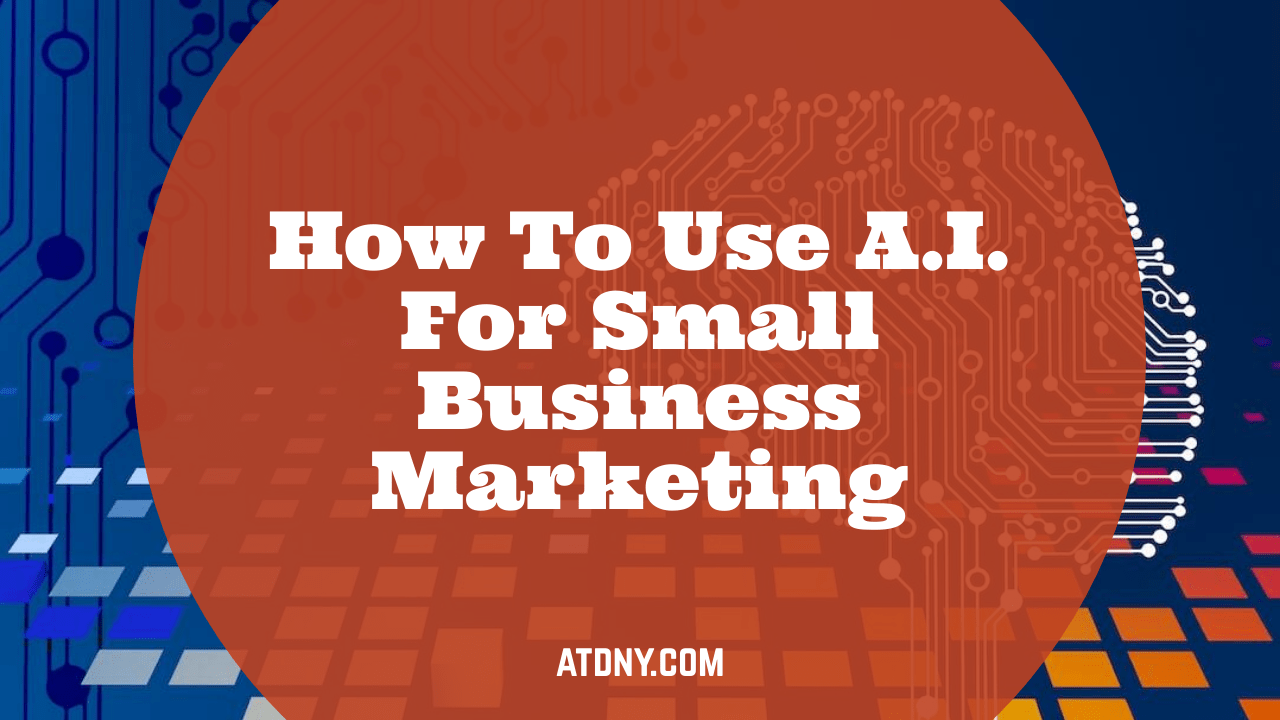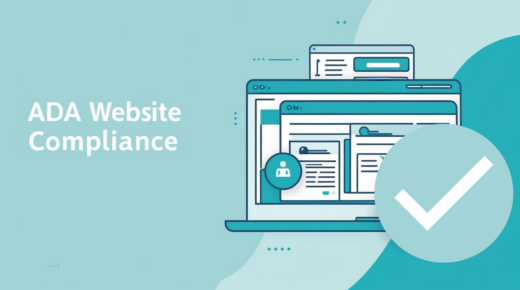What is A.I.?
Artificial intelligence, commonly referred to as A.I., is a powerful tool that has revolutionized numerous industries, including small business marketing. A.I. involves the use of machines and computers to simulate intelligent behavior, enabling them to perform tasks that would typically require human intelligence. In the context of marketing, A.I. enables small businesses to automate routine and repetitive tasks, analyze complex data, and generate valuable insights to inform their marketing strategies. With A.I., small businesses can utilize advanced technologies such as natural language processing and machine learning to create personalized experiences for their target audience, enhance customer engagement, and drive business growth. By harnessing the capabilities of A.I., small businesses can maximize their marketing efforts, improve efficiency, and effectively compete in the digital landscape.
Benefits of Using A.I. for Small Business Marketing
Using artificial intelligence (A.I.) for small business marketing provides numerous benefits that can significantly enhance efficiency and effectiveness. A.I. enables the automation of manual tasks, freeing up time for business owners to focus on other crucial aspects of their operations.
One key advantage is A.I.’s capability to analyze customer data. A.I. marketing tools can extract valuable insights from large volumes of data, helping small businesses understand their target audience better. By identifying trends and patterns, businesses can make informed decisions regarding marketing strategies and customer engagement.
A.I. also empowers small businesses to provide personalized experiences to their customers. These tools can generate personalized product recommendations based on previous purchases or browsing behavior. This level of customization improves customer satisfaction and boosts conversion rates.
Engaging with customers is made easier with A.I.-powered chatbots. They can handle routine customer service queries, providing quick responses and resolving issues promptly. Chatbots ensure a faster response time, leading to improved customer engagement and loyalty.
Another benefit is A.I.’s ability to tailor marketing campaigns based on sentiment analysis. By analyzing customer feedback, A.I. tools enable businesses to understand customer sentiments, preferences, and pain points. This knowledge helps small businesses create targeted marketing messages that resonate with their audience.
In summary, utilizing A.I. in small business marketing brings automation, efficiency, and effectiveness to the content creation process. By analyzing customer data, providing personalized recommendations, engaging through chatbots, and tailoring marketing campaigns, small businesses can enhance their online presence and reach a wider audience.
Understanding Your Target Audience
Understanding your target audience is crucial for the success of any small business marketing strategy. By utilizing artificial intelligence (A.I.) tools, businesses can gather and analyze large volumes of customer data to gain valuable insights. These insights help businesses identify trends, patterns, and preferences among their audience, enabling them to make informed decisions regarding their marketing campaigns and customer engagement. A.I. enables small businesses to go beyond demographic information and delve into the behaviors, interests, and needs of their target audience. This deep understanding allows businesses to create personalized experiences, tailored messaging, and targeted marketing campaigns that resonate with their intended customers. With A.I., small businesses can gain a competitive edge by delivering the right message at the right time to the right audience, leading to improved customer satisfaction, increased conversions, and overall business growth.
Identifying Your Target Audience
Identifying and understanding your target audience is crucial for small business marketing success. With the advent of artificial intelligence (AI) tools, this process has become easier and more efficient than ever before. AI-powered technologies, such as machine learning and natural language processing, can analyze vast amounts of customer data to provide valuable insights into your target audience.
By utilizing these AI tools, small businesses have the ability to discover detailed information about their customers’ preferences, behaviors, and interests. This information allows for more precise and accurate content creation and marketing strategies. Instead of relying on guesswork, businesses can employ a people-centric approach that caters specifically to their target audience’s needs and desires.
By leveraging AI tools, small businesses can gain a deeper understanding of their target audience’s motivations and pain points, enabling them to create personalized experiences and tailored marketing messages. This not only increases customer satisfaction but also enhances customer engagement and drives business growth.
In today’s competitive digital landscape, being able to identify and connect with your target audience is crucial. AI tools provide small businesses with the insights needed to make informed decisions, allowing them to create effective and targeted marketing campaigns that resonate with their audience. With AI as a powerful tool, small businesses can stay ahead of the competition and grow their online presence.
Creating Content that Resonates with Your Audience
Creating content that resonates with your audience is crucial for the success of any small business marketing strategy. By understanding your target audience’s specific needs and preferences, you can create content that not only captures their attention but also drives engagement and conversions.
To begin, it is essential to thoroughly research and analyze your target audience. This involves identifying their demographics, interests, and motivations. By using AI-powered tools, such as customer experience analytics and social listening platforms, you can gain valuable insights into your audience’s behaviors, preferences, and pain points.
Once you have a clear understanding of your target audience, it is important to tailor your content accordingly. This means creating content that speaks directly to their interests and motivations. Whether it’s through blog posts, social media content, social media posts, or email campaigns, every piece of content should be designed with the target audience in mind.
AI-powered content generation tools can be invaluable in efficiently creating high-quality and engaging content. These tools utilize advanced algorithms and natural language processing to generate content that matches the preferences of your target audience. By automating repetitive tasks and providing actionable insights, these tools save time and enhance the content creation process.
Through the combination of content personalization, AI-powered content generation tools, and a deep understanding of your target audience, you can create content that resonates with your audience and drives real results in your small business marketing efforts.
AI-Powered Tools to Utilize in Your Small Business Marketing Strategy
Introduction:
AI-powered tools have become increasingly popular in small business marketing strategies. By leveraging artificial intelligence technologies, businesses can streamline processes, personalize experiences, and make informed decisions. In this article, we will explore some of the key AI-powered tools that small businesses can utilize to enhance their marketing efforts and drive business growth. From customer analytics and content generation to social media management and email marketing, these tools offer valuable insights, automation, and efficiency to help businesses effectively engage with their target audience and stay ahead in the competitive marketing landscape.
Natural Language Processing (NLP)
Natural Language Processing (NLP) is an essential tool in small business marketing. It has revolutionized the way businesses understand and analyze natural language search queries, thereby improving customer experience and communication.
NLP allows businesses to go beyond simple keyword searches and tap into the true intent and context behind customer queries. By analyzing the language used by customers, businesses can gain valuable insights into their preferences, pain points, and needs. This understanding enables businesses to personalize their marketing messages and create a more engaging experience for their customers.
Furthermore, NLP empowers businesses to communicate more effectively with their customers. By using NLP-powered tools, businesses can develop sophisticated customer service solutions that can accurately interpret and respond to customer inquiries. This not only improves response time but also enhances overall customer satisfaction.
In addition, NLP can help businesses improve their search engine optimization (SEO) efforts. By understanding the language patterns and queries of their target audience, businesses can optimize their online presence to attract a wider audience. This results in higher website traffic, increased customer engagement, and ultimately, business growth.
In conclusion, NLP is a powerful tool that can greatly enhance small business marketing. By leveraging this technology, businesses can gain valuable insights, improve communication, and better understand their customers for more effective marketing strategies.
Automation Tools and Routine Tasks
Automation tools play a crucial role in streamlining routine tasks in small business marketing. These tools automate repetitive and time-consuming tasks, allowing businesses to focus on more strategic activities. In the content creation process, automation tools can greatly simplify and accelerate tasks such as sending automated emails, monitoring social media mentions, and analyzing customer behavior and engagement.
Automated email marketing tools enable businesses to create and send personalized email campaigns to their target audience. These tools automate the entire process, from segmenting the email list based on customer preferences to scheduling and sending the emails. This not only saves time but also ensures consistent and timely communication with potential customers.
Monitoring social media mentions and interactions can be a time-consuming task for small businesses. AI-powered tools can automatically monitor social media platforms for brand mentions, comments, and messages. These tools analyze the sentiment behind these interactions, enabling businesses to respond promptly and appropriately. This helps in maintaining a positive brand image and strengthens customer relationships.
Analyzing customer behavior and engagement is crucial for effective marketing strategies. AI-powered tools can track and analyze customer interactions with a website, providing valuable insights into their preferences, pain points, and interests. These tools can automatically generate reports and actionable insights, guiding businesses in making informed decisions to improve their marketing campaigns and customer engagement.
Top AI-powered tools for automating these tasks include Mailchimp for automated email campaigns, Hootsuite for social media monitoring, and Google Analytics for tracking and analyzing customer behavior. These tools streamline content creation tasks, save time, and improve the effectiveness of marketing efforts for small businesses. By leveraging automation tools, small businesses can focus on strategic activities and achieve better results with their marketing initiatives.
Analyzing Data and Making Predictions
Analyzing data and making predictions are essential aspects of small business marketing. By utilizing AI tools for predictive analysis, businesses can gain valuable insights and develop customized growth strategies.
AI tools for predictive analysis leverage historical data and statistical modeling techniques to anticipate future trends and patterns. These tools can analyze customer behavior, purchasing preferences, and market trends to identify potential opportunities and challenges. By evaluating past data, businesses can make informed decisions regarding product development, pricing strategies, and target audience segmentation.
One significant advantage of using AI tools for predictive analysis is the ability to develop customized growth strategies. These tools analyze vast amounts of data and provide actionable insights to help businesses tailor their marketing efforts for maximum impact. By understanding customer preferences and market dynamics, businesses can create personalized and targeted marketing campaigns to attract and retain customers.
Furthermore, AI tools enhance data analysis capabilities by extracting insights and identifying trends that may go unnoticed by human analysts. These tools can process and analyze large datasets quickly, providing businesses with a comprehensive understanding of their customer base and market dynamics. By optimizing marketing campaigns based on AI-generated insights, businesses can improve customer acquisition, increase customer satisfaction, and drive business growth.
In conclusion, leveraging AI tools for predictive analysis empowers small businesses to analyze data, make accurate predictions, and develop customized growth strategies. With a deeper understanding of market trends and customer preferences, businesses can optimize their marketing efforts and drive success in today’s competitive landscape.
Social Media Engagement Analysis Tools
Social media engagement analysis tools play a crucial role in small business marketing by helping measure audience engagement and analyze performance metrics. These tools provide valuable insights into the effectiveness of social media campaigns and enable businesses to make data-driven decisions for their marketing strategies.
One popular tool for social media engagement analysis is Sprout Social. It offers features that allow businesses to track engagement metrics, monitor brand mentions, and analyze audience demographics. The platform provides a campaign dashboard that displays key performance indicators, such as likes, comments, and shares, in a visually appealing format. This allows businesses to quickly assess the success of their social media content and make adjustments as needed.
Another notable tool is Hootsuite, which offers comprehensive analytics and reporting features. It provides businesses with detailed performance metrics, including reach, engagement rate, and click-through rates. Additionally, Hootsuite’s customer segmentation capabilities enable businesses to target specific audience segments with personalized content, enhancing customer engagement.
Platforms like Smartly.io go beyond simple social media engagement analysis by integrating with major social media platforms like Facebook and Instagram. They provide campaign dashboards to monitor performance in real-time and offer advanced features like audience segmentation and performance metrics tracking. This allows businesses to optimize their social media campaigns and maximize their return on investment.
In conclusion, social media engagement analysis tools are essential for small businesses to measure audience engagement, analyze performance metrics, and optimize their social media marketing strategies. These tools, such as Sprout Social, Hootsuite, and Smartly.io, provide valuable insights and features that help businesses effectively engage with their target audience and drive business growth.
Email Campaigns and Subject Lines Optimization Tools
Small businesses can greatly benefit from using AI-powered tools to optimize their email campaigns and subject lines. By incorporating artificial intelligence into their marketing strategies, businesses can achieve higher click-through rates, increased revenue, and improved customer engagement.
One valuable tool for small businesses is Phrasee, an AI platform that uses natural language processing to generate compelling and personalized email subject lines. By analyzing data from millions of previous email campaigns, Phrasee’s algorithms can predict which subject lines are most likely to resonate with the target audience. This helps businesses cut through the noise and capture the attention of potential customers.
Another tool that can help small businesses personalize their email content and improve customer engagement is rasa.io. This AI-powered platform leverages machine learning to deliver curated email newsletters that are tailored to individual recipients. By analyzing each subscriber’s preferences and behaviors, rasa.io ensures that the content is relevant and interesting to them, creating a more personalized experience.
Using AI-powered tools for email campaigns and subject lines optimization not only saves time and effort but also generates actionable insights that can inform decision-making. These tools allow small businesses to deliver the right message to the right audience at the right time, ultimately driving better customer satisfaction and business growth.
Implementing A.I.-Powered Marketing Strategies into Your Business Model
In today’s digital age, small businesses can greatly benefit from integrating artificial intelligence (A.I.) into their marketing strategies. By leveraging A.I.-powered tools and technologies, businesses can enhance their online presence, improve customer engagement, and make more informed decisions. From generating compelling content to personalizing customer experiences, A.I. can revolutionize small business marketing. In this article, we will explore how small businesses can effectively implement A.I.-powered marketing strategies to achieve business growth and success.
Personalizing the Customer Experience with A.I.
In today’s competitive market, personalization has become a vital aspect of small business marketing. Customers expect tailored experiences that make them feel valued and understood. This is where artificial intelligence (AI) comes in, offering businesses the opportunity to provide personalized experiences at scale.
AI-powered marketing tools have the ability to adapt sales and marketing strategies to generate personalized experiences for customers. By analyzing customer data and behavior, these tools can segment customers based on their preferences and deliver targeted messages. This personalization helps businesses engage with their target audience more effectively, increasing customer satisfaction and loyalty.
Predictive analysis, another AI-powered capability, allows businesses to understand customer behavior and buying habits. By analyzing large sets of data, AI can identify patterns and trends that may not be apparent to humans. This information enables businesses to anticipate customer needs and deliver personalized offers and recommendations, resulting in higher conversion rates and customer retention.
Personalization using AI marketing tools not only benefits customers but also saves time for businesses. By automating repetitive tasks such as content creation or email campaigns, small businesses can focus on more strategic activities. AI also reduces human errors and response time, leading to improved customer service and satisfaction.
In conclusion, personalizing the customer experience with AI is crucial for small businesses. By utilizing AI marketing tools, businesses can adapt their sales and marketing strategies to deliver personalized experiences that resonate with customers. The ability to predict customer behavior and automate routine tasks is invaluable for business growth in today’s digital age.
Leveraging Chatbots and AI-Powered Support Solutions
Chatbots and AI-powered support solutions play a crucial role in small business marketing by providing efficient and instant customer service. With the rise of technology, customers expect quick responses to their queries and inquiries. This is where chatbots come in, offering businesses the ability to address customer concerns and provide support in real-time.
One of the main benefits of leveraging chatbots is their ability to provide instant responses to customer support queries. Instead of waiting for a human support representative to become available, customers can interact with a chatbot and receive immediate assistance. This not only improves customer satisfaction but also saves time for both the customer and the business.
Chatbots also excel at addressing repetitive questions. Instead of having customer service representatives answer the same queries repeatedly, chatbots are programmed to recognize and respond to common questions automatically. This frees up human support agents to focus on more complex and unique customer issues.
Several popular AI chatbot options are available in the market today. Netomi, atSpoke, and Zendesk are all well-known and trusted platforms that offer AI-powered support solutions. These chatbot options utilize natural language processing and machine learning to provide accurate and context-aware responses to customer queries.
In conclusion, leveraging chatbots and AI-powered support solutions in small business marketing is crucial for providing instant responses to support queries and addressing repetitive questions. By utilizing these technologies, businesses can enhance their customer service and improve overall customer satisfaction.
Creating an Engaging Online Presence with A.I.-Based Solutions
Creating an engaging online presence is crucial for small businesses looking to stand out in today’s digital landscape. Fortunately, AI-based solutions can play a significant role in achieving this goal.
One effective way to utilize AI is through the use of AI-powered chatbots. These intelligent virtual assistants can be integrated into a business’s website or social media platforms to interact with customers in real-time. Not only do chatbots provide instant responses to customer queries, but they can also offer personalized recommendations and support based on the customer’s preferences and needs. With advanced natural language processing capabilities, chatbots can understand and analyze customer inquiries, ensuring accurate and context-aware responses.
Another key aspect of creating an engaging online presence is through effective social media marketing. AI social media tools like Smartly.io can greatly assist small businesses in planning, testing, and launching targeted ad campaigns on various platforms such as Facebook, Snapchat, Pinterest, and Instagram. With AI-powered technology, these tools can analyze data, optimize ad performance, and generate valuable insights, enabling businesses to reach their target audience more effectively.
In conclusion, integrating AI-based solutions into a small business’s online marketing strategy can help create an engaging online presence. AI-powered chatbots offer personalized recommendations and support, while AI social media tools like Smartly.io enhance targeted ad campaigns, ultimately boosting customer engagement and driving business growth.





